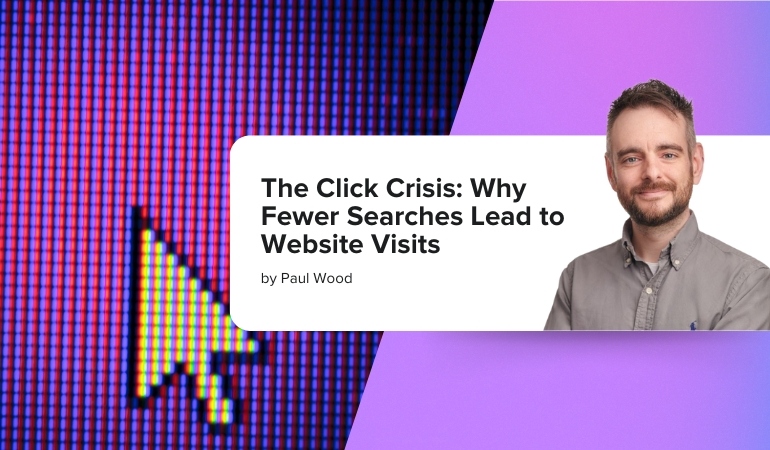The rise of zero-click
Google is sending less traffic to the open web.
Two recent studies have revealed the scale of a growing trend that is seeing both paid and organic CTRs (click-through rates) decline on Google Search.
Firstly, in July 2024, SparkToro published a study into so-called ‘zero-click searches’. According to that study, of every 1,000 searches carried out on Google in Europe, only 374 clicks go to the open web.
60% of searches result in no click; ie they are ‘zero-click searches’.
When a user does click, there’s about a 25% chance it’s to a Google-owned property (such as YouTube, Maps, etc).
AI’s attack on CTRs
An additional study, conducted by Seer Interactive, a marketing agency, has found that CTRs (click-through rates) from Google are at an all-time low.
The study, which looks at roughly 10,000 keywords, filtered to include only those believed to have an ‘informational’ intent aimed to find search results containing an AI Overview (Google’s AI-driven search result feature).
The results show a couple of standout things; firstly, there’s a significant drop in CTR between a search result that contains an AI Overview versus one which does not.
In January 2025, the CTR for an organic search result with no AI Overview was 3.97%. When an AI Overview was shown, this dropped to a paltry 0.64%.
The second standout finding is that CTR has dropped over the course of a year, with some exceptions.
Organic search results have hoovered somewhere between 2-4% between January 2024 and 2025. Organic results where an AI Overview is shown, however, have dropped from 1.41% down to a new low of 0.64%.
Paid search is suffering a similar fate. The CTR for a paid search ad in January 2025 was 17.25% but reduced to only 6.56% when an AI Overview is shown.
Paid search CTR in general is down from the previous year, dropping from over 23% to 17%.
What’s going on with search CTRs?
The studies suggest that clicks from search results are getting increasingly less likely. It’s nothing new that Google’s search results page is the destination for many users.
If you search for a sports score or look up the local weather report, more often than not, you can get everything you need from Google’s own results page.
With the introduction of AI Overviews, this is becoming the case for a wider range of searches. Google is now able to answer questions with depth and clarity it could only dream of a few years ago.
It’s worth commenting, AI Overviews typically show on results pages for informational searches and are perhaps, therefore, less likely to send traffic to websites anyway, however, the data in the reports mentioned suggests the trend is moving only in one direction.
What should we do?
More than ever on the web, being the authority on a subject is going to be what sorts the wheat from the chaff.
Google makes money when people click ads or stay on its platform, enabling users to see more ads.
With this in mind, the incentive system that governs Google Search is strongly geared towards answering as many searches directly on the results page.
It means that increasingly, if your brand is referenced within a search result, you may not receive a click.
This feels instinctively bad, but it doesn’t need to be.
In the same way that a brand mentioned in a popular magazine benefits from a growing profile, so (potentially) do the brands referenced within search results, click or no click.
Regardless of Google’s CTR trends, marketers also face a brave new world in the face of a growing uptake of AI tools such as ChatGPT. Increasingly, audiences will turn to AI tools to find answers, and often these won’t result in a click.
It means that brands need to focus on taking ownership of information and assume that the information will be quoted, repurposed, and accessed indirectly by audiences using a growing arsenal of AI-driven tools.
When publishing information, brands need to do so with the knowledge that they are going to be training a plethora of large language models (LLMs) and said models will quote and reference them.
More than ever on the web, being the authority on a subject is going to be what sorts the wheat from the chaff.





